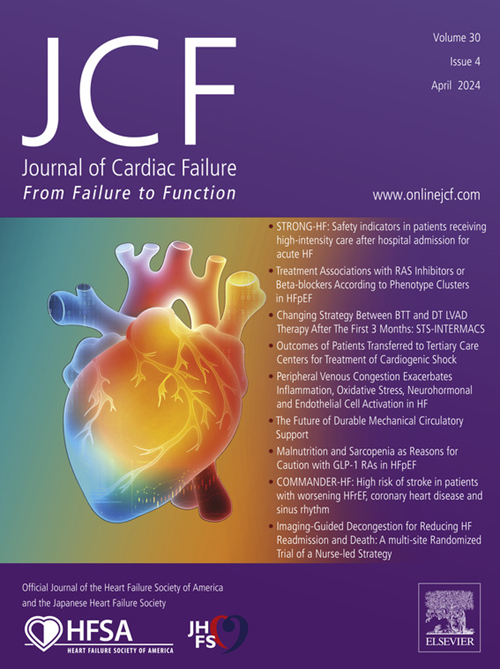接受心脏移植和左心室辅助装置治疗的终末期心力衰竭患者的基因检测实践和病理评估。
IF 8.2
2区 医学
Q1 CARDIAC & CARDIOVASCULAR SYSTEMS
引用次数: 0
摘要
背景:遗传性心肌病(CM)越来越被认为是终末期心力衰竭(ESHF)的病因。确定 ESHF 的遗传病因对预后和家庭具有重要意义。然而,对 ESHF 患者的基因检测方法研究不足:这项单中心回顾性研究纳入了 2018 年至 2023 年接受心脏移植(HT)或左心室辅助装置(LVAD)的连续 ESHF 患者。从电子病历中收集了包括基因检测和病理报告在内的数据。根据基因检测完成情况和是否存在临床可操作变异,对人口统计学和临床特征进行分层分析。进行逻辑回归以评估组织学结果与基因变异之间的关联:该研究共纳入了 529 名成年患者(平均年龄 57 岁),他们主要为男性(79%,422/529)和非白人(61%,322/529)。54%(196/360)的非缺血性或混合型 CM 患者进行了基因检测。36%的患者(70/196)得到了临床可操作的结果,其中只有43%的患者(30/70)得到了遗传咨询师的转介。最常见的基因变异是 TTN(32%,24/75)、MYBPC3(13%,10/75)和 TTR(11%,8/75)。在已知有心衰诱因(如酗酒)的患者中发现了具有临床可操作性的变异。在多变量分析中,病理检查中出现间质纤维化,特别是弥漫性间质纤维化与临床可操作变异显著相关(aOR 2.29,95% CI [1.08-4.86],p = 0.03):结论:接受晚期治疗的ESHF非缺血性或混合型CM患者接受基因服务(包括检测和咨询师)的比例较低,尽管遗传病的负担很重。病理检查结果(如间质纤维化)可能有助于了解遗传病因。服务利用率低表明,需要采取实施策略来提高服务利用率。本文章由计算机程序翻译,如有差异,请以英文原文为准。

Genetic Testing Practices and Pathological Assessments in Patients With End-stage Heart Failure Undergoing Heart Transplantation and Left Ventricular Assist Device Use
Background
Genetic cardiomyopathies (CMs) are increasingly recognized as causes of end-stage heart failure (ESHF). Identification of a genetic etiology in ESHF has important prognostic and family implications. However, genetic testing practices are understudied in patients with ESHF.
Methods
This single-center, retrospective study included consecutive patients with ESHF who underwent heart transplantation (HT) or left ventricular assist device (LVAD) implantation between 2018 and 2023. Data, including genetic testing and pathology reports, were collected from the electronic medical records. Analyses of demographic and clinical characteristics were stratified by genetic-testing completion and the presence of clinically actionable variants. Logistic regression was performed to evaluate for associations between histology findings and genetic variants.
Results
A total of 529 adult patients (mean age 57 years) were included in the study and were predominantly male (79%, 422/529) and non-white (61%, 322/529). Genetic testing was performed in 54% (196/360) of patients with either nonischemic or mixed CMs. A clinically actionable result was identified in 36% (70/196) of patients, of whom only 43% (30/70) had genetic counselor referrals. The most common genetic variants were TTN (32%, 24/75), MYBPC3 (13%, 10/75) and TTR (11%, 8/75). Clinically actionable variants were identified in patients with known heart failure precipitators such as alcohol use. In multivariable analysis, the presence of interstitial fibrosis, specifically diffuse, on pathology was significantly associated with a clinically actionable variant (aOR 2.29, 95% CI [1.08–4.86]; P = 0.03).
Conclusion
Patients with ESHF and with nonischemic or mixed CM who were undergoing advanced therapies had low uptakes of genetic services, including testing and counselors, despite high burdens of genetic disease. Pathology findings such as interstitial fibrosis may provide insight into genetic etiology. The underuse of services suggests a need for implementation strategies to improve uptake.
求助全文
通过发布文献求助,成功后即可免费获取论文全文。
去求助
来源期刊

Journal of Cardiac Failure
医学-心血管系统
CiteScore
7.80
自引率
8.30%
发文量
653
审稿时长
21 days
期刊介绍:
Journal of Cardiac Failure publishes original, peer-reviewed communications of scientific excellence and review articles on clinical research, basic human studies, animal studies, and bench research with potential clinical applications to heart failure - pathogenesis, etiology, epidemiology, pathophysiological mechanisms, assessment, prevention, and treatment.
 求助内容:
求助内容: 应助结果提醒方式:
应助结果提醒方式:


